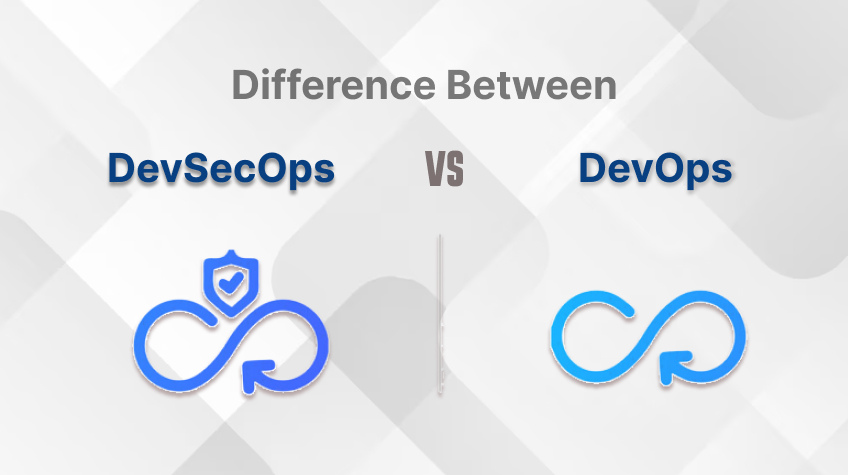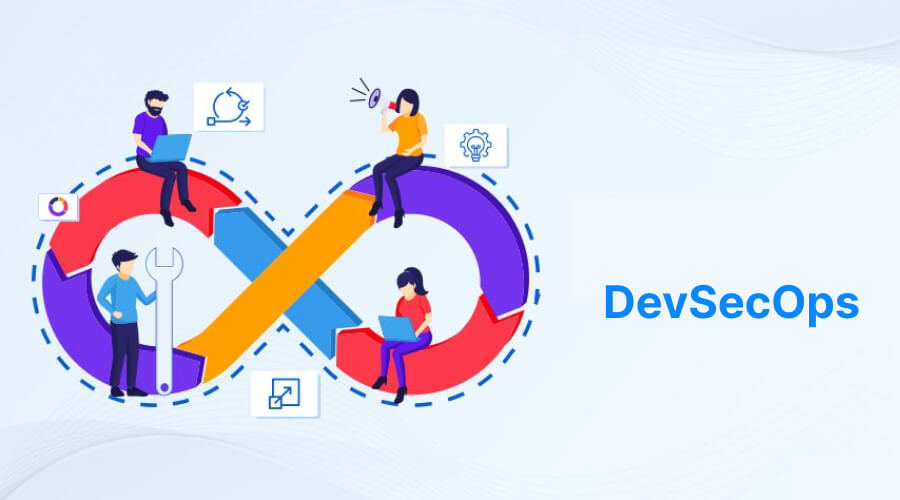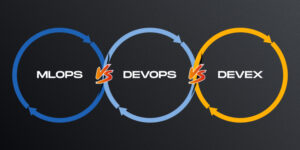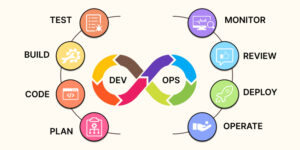
Software development is at its peak today. Due to the proliferation of software delivered in the form of software as a service (SaaS), many companies have begun to recognize the significance of effective software development. Software and application programmes are essential to the success of organizations across all sectors. Whether it’s meeting their business goals or enhancing customer experience, software development helps businesses tremendously. Whatever the case, DevSecOps vs. DevOps play a significant role in building and maintaining code while ensuring its safety.
So, what is the difference between DevSecOps vs. DevOps?
If you’re wondering how DevSecOps vs. DevOps are different, then this post is for you.
In this post, we shall discuss all the significant differences between DevSecOps and DevOps, along with their impacts.
So, let’s get started…
What does “DevOps” stand for?
DevOps stands for “development,” and “operations.” It is a collaborative organizational approach that brings together the teams responsible for creating and operating the software. The goal of DevOps is to shorten the amount of time needed to provide users with software upgrades and new features.
It is a hybrid approach that incorporates aspects of both software development (Dev) and information technology operations (Ops). DevOps is an initiative that aims to automate and enhance the process of delivering software, beginning with the development stage and continuing on through testing and deployment.
DevOps lessens the number of steps, allowing the process to be completed more quickly and with less effort. Additionally, the goal of DevOps is to improve communication and collaboration between the teams responsible for development and operations. DevOps may assist organizations in increasing their productivity and decreasing the amount of time it takes to deliver products by automating and standardizing various procedures. DevOps is becoming increasingly popular in today’s business world. Many businesses are now offering online DevOps training courses to help their employees become more technically proficient and contribute to their expansion.
In addition, DevOps may assist in enhancing the quality of software by simplifying the process of finding and correcting problems. The overall objective of the DevOps approach is to increase the speed, quality, and efficiency of software delivery. DevOps engineers typically have experience and skills in both coding and system administration.
What does “DevSecOps” stand for?
DevSecOps, which stands for “development, security, and operations,” is an approach for creating software that takes security measures into account from the very beginning of the software creation process.

Integrating security measures at every stage of the software development life cycle is the goal of the DevSecOps practice. The DevSecOps concept emerged from the DevOps movement and expanded upon the foundation that DevOps established. DevSecOps, on the other hand, takes a broader approach to security by including it into every stage of the software development process. When working in the cloud, which demands adhering to certain security principles and practices, DevSecOps becomes an absolutely necessary practice.
DevSecOps is used to increase software delivery speed while simultaneously decreasing its vulnerability exposure. When put into effect, DevSecOps relies on automation and collaboration tools to improve coordination and productivity across the three departments responsible for software creation: development, security, and operations. The incorporation of security procedures into the DevOps process makes this a reality.
Learning the difference between DevSecOps vs. DevOps is imperative to understand what your company requires in order to advance in the realm of software and application development. Although both DevSecOps and DevOps have some similarities, they are each ultimately focused on different business goals.
Having a better understanding of both can help your company make a seamless switch from DevOps to DevSecOps.
Let’s now take a look at some of the differences between DevSecOps and DevOps…
Related Post: Top 10 Amazing DevSecOps Tools: Tools Activities Guidebook
DevSecOps vs. DevOps
Here are some key distinctions between DevSecOps and DevOps based on different aspects… in several key areas…
1. Approach
DevOps and DevSecOps are acknowledged as two of the most influential streams within the software development industry. Both of these philosophies have their own sets of upsides and downsides. So, it becomes crucial for an organization to consider its requirements before choosing one.
The primary focuses of DevOps are speed and effectiveness. DevOps focuses on implementing new features as rapidly as feasible without compromising the product’s overall level of quality. This approach is perfect for companies that need to roll out new software updates as quickly as possible.
On the other hand, DevSecOps focuses an increased emphasis on the safety of the system. DevSecOps primarily focuses on eliminating the possibility of vulnerabilities and dangers being introduced into the codebase in the first place. This approach is best suited for companies that deal with sensitive data or are required to adhere to severe compliance rules.
2. Goal
DevOps is a modern approach that encourages communication and cooperation between IT operations and software development groups. The DevOps movement’s ultimate goal is to accelerate and improve software development overall by eliminating wasteful steps along the way.

DevOps helps eliminate barriers between departments, which is one of its main advantages. These silos between departments are a major source of inefficiency. This is why it might be difficult to implement the DevOps technique, especially in large enterprises with well-established norms and practices.
The DevSecOps strategy builds on the DevOps technique by adding a heightened focus on security. Like DevOps, the goal of DevSecOps is to improve the efficiency and efficacy of the software development process. However, while implementing DevSecOps, software developers must handle security risks throughout the development process, not just at the end. This precaution may significantly slow down the development process; however, it can help prevent security flaws from being introduced.
In a nutshell, companies that value speed and frequent product feature updates should opt for DevOps. However, if security is what the company is looking for, then companies should prioritize implementing DevSecOps.
3. Purpose
Both DevOps and DevSecOps are types of software development approaches that place emphasis on the developers’ and operations teams’ ability to work together and communicate effectively. However, there is a fundamental difference between DevOps vs. DevSecOps.
DevOps focuses on optimizing the software development process, but DevSecOps incorporates security as a key concern. In particular, DevOps works to lessen the likelihood of security flaws in code. DevSecOps is an approach that helps organizations minimize security flaws and streamline adherence to regulations. This is achieved by incorporating security measures into the design phase of the project.
4. Highlights
Both DevOps and DevSecOps are two of the most common software development methodologies used these days. Both of these techniques place a strong emphasis on collaboration and communication between the operations crew and the software developers. While both DevOps and DevSecOps prioritise speed and efficiency, DevOps emphasises more on speed and efficiency while DevSecOps focuses more on security. As a direct consequence of this, DevSecOps is frequently regarded as a more all-encompassing method of software development.
Companies that adopt a DevOps approach typically focus on improved product quality and shorter delivery times. Most companies that emphasize continuously integrating and delivering new features implement DevOps. It helps businesses boost productivity, enhance customer experience and achieve their business goals.
DevSecOps, on the other hand, puts security at the forefront more so than other approaches. Security is taken into account from the very beginning of the software development process all the way through to its completion. By incorporating security checks throughout the entire process, businesses may reduce the risk that vulnerabilities will be introduced into the code. However, it decreases the speed at which the software is delivered. Organizations can ensure the safety and security of their apps while also benefiting from quicker delivery times by utilizing automation and collaboration tools.
5. Upkeep & Maintenance
The software’s creation and upkeep are the DevOps teams’ responsibility. DevSecOps teams, on the other hand, ensure the safety and security of the programme. Each team needs to have an exceptionally high level of skill.
DevOps teams typically place a greater emphasis on the more technical aspects of software development, whereas DevSecOps teams place a greater emphasis on security. As a result, DevSecOps teams typically possess a deeper understanding of how to defend software against attack.
6. Advantages
When it comes to successful software development, both DevOps and DevSecOps play a crucial role. DevOps is used to streamline the process of releasing software by emphasizing the need for collaboration and communication between the development and operations teams. On the other hand, DevSecOps goes one step by integrating security precautions into the collaborative process. The end result is an extremely safe and productive method of software development.
However, due to the added security measures, putting DevSecOps into practice may be more challenging and more time-consuming than standard DevOps. More companies get stuck in DevOps vs. DevSecOps. However, the answer ultimately lies in the needs and priorities of the organization. While both methods have their benefits, the increased security provided by DevSecOps advantage for organizations, especially for the ones dealing with sensitive data.
The Bottom Line
So, this is all about DevSecOps vs. DevOps. Both DevOps and DevSecOps are essential to the success of businesses. The primary goal of the DevOps movement is to reduce the time required for moving a product from the development stage to the production stage. Implementing a DevSecOps strategy is intended to guarantee the safety and security of products before they are put into production. Instead of being a last-minute consideration, software security should be incorporated at the very beginning of the software development life cycle.
Of course, there are significant differences between DevSecOps vs. DevOps. That’s the reason each company must determine its needs before implementing a particular methodology. It’s a major decision that can impact your business goals dramatically.
FAQs
1. Which is better DevSecOps vs. DevOps?
Well, when it comes to determining which methodology to use, companies must consider their requirements. It is because each methodology offers distinct advantages. Both methodologies are superior in their own ways.
DevOps prioritize speedier software development, whereas, DevSecOps prioritizes security from the very beginning of the software development process. DevOps is the right choice for businesses that want to improve their customers’ experiences by offering them frequent updates. In contrast, companies that deal with sensitive data must focus on implementing DevSecOps.
2. How is DevOps Different from the DevSecOps process?
DevOps’ best practices have revolutionized the software development industry. It integrates software development, deployment, and management. The operations and development teams work closely to create software. DevOps help release faster updates. However, with more and more cybercriminals eying on your data privacy, incorporating security features has become an integral part of the development process. And that’s when DevSecOps come into play. DevSecOps is a workflow that integrates security into the whole DevOps process. This allows organizations to respond to and mitigate possible threats more effectively.
3. What kinds of challenges does DevSecOps address?
DevSecOps is an approach that improves overall efficiency and reduces potential risks by integrating security evaluations and considerations into the development and operations processes. This methodology aims to reduce the number of separate silos that make up an organization and encourages the participation of all team members in the process of securing digital systems. DevSecOps is a methodology that gives a solution to the ever-increasing problem of data breaches and cyberattacks in a world that is becoming increasingly digital.
4. How many distinct components does the DevSecOps strategy comprise?
Collaboration, integration, automation, measurement, and sharing are the five core components that make up the DevSecOps strategy. Each of these guiding principles contributes to the overall improvement of the safety and effectiveness of a process that involves software development and operations. Organizations may create a potent DevSecOps strategy if they work together, incorporate security at each stage of the development process, automate routine duties, keep close tabs on development, and share knowledge and resources.
5. What are the steps involved in transitioning from DevOps to DevSecOps?
Transitioning from DevOps to DevSecOps is becoming increasingly popular these days. The ideal method to migrate from DevOps to DevSecOps is to increase your expertise and awareness of security practices and integrate them into your workflow. This will allow you to make the change as smoothly as possible.
Basically, DevSecOps focuses on implementing security features at every stage of the software development process. This also includes conducting frequent security audits and vulnerability testing.
Additionally, in order to successfully transition from DevOps to DevSecOps, it is essential to have good communication and teamwork abilities. Moreover, you will be able to make the shift from DevOps to DevSecOps if you continuously incorporate security practices into your normal workflow.






